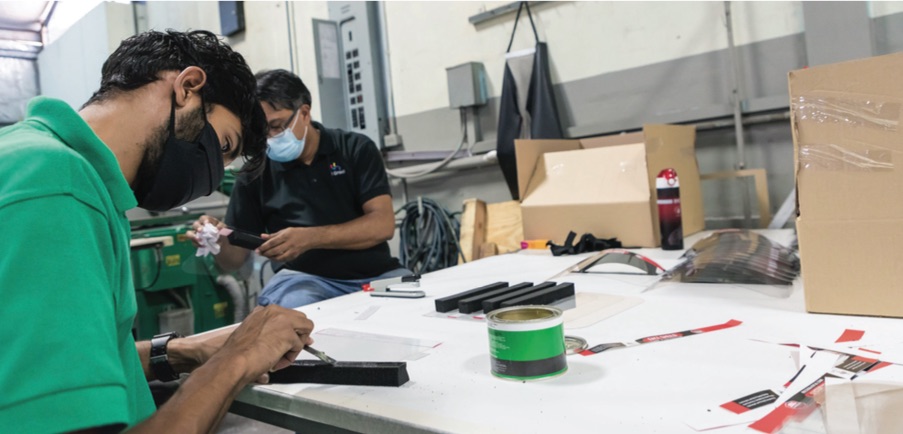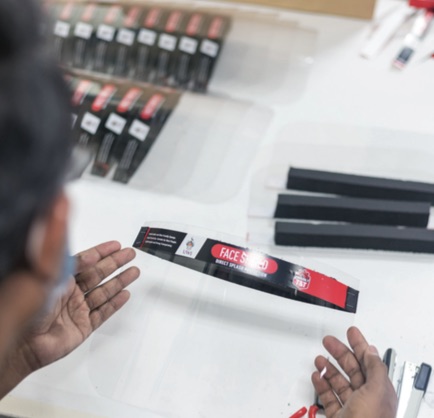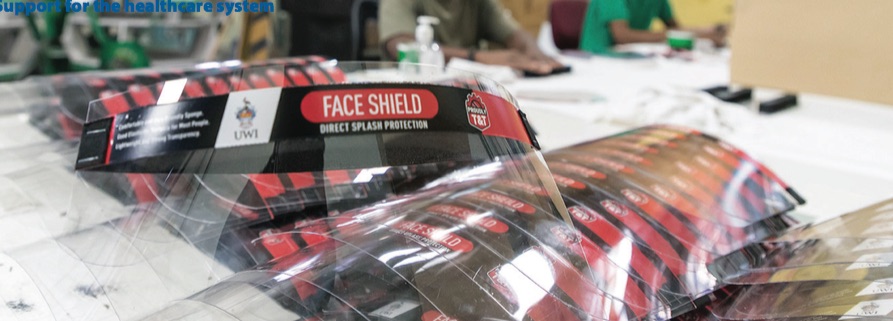Professor Copeland sees the role of The UWI is to “bring science, best practice and expertise to the table”, says Persad. The team is responsible for the design work and prototypes for the ventilators and personal protective equipment (PPE). In the early stages (mid-March), they also reached out to business, industry, government and academics for support. After the designs and models have been approved, “our job is to then transfer that knowledge to, for example, the manufacturing sector who can mass produce,” he says.
Since those original days of the project, there has been a building momentum, driven by campus’ formalisation of the work as well as their partners in Government and the private sector.
Dr Arvind Singh, Lecturer in the DECE and member of the medical manufacturing team, says there has been a “great response from the manufacturing sector with many companies donating time and resources to the effort.”

The four main items initially undertaken by UWI St Augustine are at various stages of completion:
Face shields: Completed and currently being mass produced.
N95 respirators and surgical masks: UWI is working with MIC Institute of Technology to make an injection mould to mass produce respirator masks that will be equivalent to n95. At the time of writing, they were also seeking donors to purchase a piece of equipment for CARIRI to test the masks and make sure they provide the equivalent protection.
Cloth face masks: TTMA has reached out to its garment manufacturers to source bulk material, which has been tested and certified by CARIRI, and die cut to produce masks based on an optimised prototype. The plan is to make the die cut material publically available to seamstresses who can then sew the masks on approved designs.
“It’s a win-win,” says Persad. “Many people can make but the masks will be based on the best designs.”
He says they were considering putting “patriotic messages” and visuals on the masks.
Ventilators: Working under the designation “UWI-Vent”, the ventilator system is far along in the design phase. Work is ongoing but the UWI engineers are challenged by a scarcity of parts.

“As you can imagine, we are experiencing global supply chain challenges that we are working arduously to overcome,” says Christin Parma, UWI alum and electrical and computer engineer at design company FaSove.
The team is exploring alternatives such as industrial components from the food and manufacturing sector which are equivalent in grade and functionality. The next step is to build the prototype and work with doctors to test it.
Members of The UWI team say there is great demand for not only the four items but also additional medical equipment.
DECE instructor Azim Abdool notes that even as they are working, “doctors, are bringing up other pieces of equipment that may be necessary – such as syringe pumps and oxygen hoods”.
They have already completed prototype aerosol hoods and are currently testing a video laryngoscope in hospital. As hard as they work, there is always more to do.
"Work is Sunday to Sunday, approximately 18 hours a day,” says UWI lecturer Dr Sean Rocke, who also has his obligations as an educator to meet, as his classes have moved online. “Considerable time is spent reaching out to persons who want to help to see how they can assist. This is perhaps both comforting as well as difficult based upon the extent and number of the interactions. People want to help but you have to direct them to ways that they can help.”
Elizabeth Persad, wife of Jeevan and also an engineer, says, “His phone starts ringing sometimes by 7am or 7.30am. By 10pm he is still getting calls.”
Apart from the long hours, the Persads have the added risk of possible infection. Jeevan is the designated member of the team that makes the site visits to the hospitals and manufacturing plants. They are concerned, but Elizabeth consoles herself with the knowledge that they live alone and are not in the high-risk category for COVID-19 infection.
“She’s patient,” he says. “She is providing moral support. Without her support, it would have been a lot tougher.”
Yet they are all committed to the project. Many of them saying it is because of their desire to help society and their respect and concern for healthcare workers.
“We just want to do our part to help out.” Lynda Sirju, development engineer at FaSove adds: “We may not have the financial resources as some do but we are engineers and we can use our knowledge to help improve the working conditions for the healthcare workers and other essential services who have to carry out their jobs.”

For more information on The UWI St Augustine manufacturing campaign, visit https://sta.uwi.edu/covid19/campaign.php
For other COVID-19 related work and news, visit https://sta.uwi.edu/covid19/index.php
Azim Abdool, Kevon Andrews, Ravi Deonarine, Christin Parma, Jeevan PErsad, Craig Ramlal, Sean Rocke, Arvid Singh, Lynda Sirju